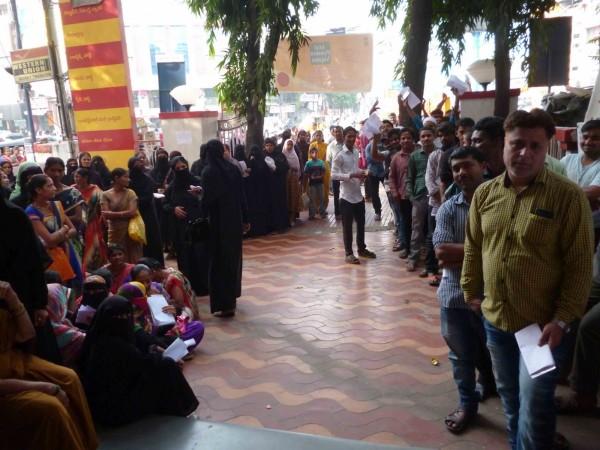
A joint committee formed by representation from the Ministry of External Affairs and the Finance Ministry is expected to issue instructions in order to easy difficulties being faced by Nepalese and Bhutanese migrants in India and those possessing the scrapped currencies in neighboring countries.
Led by additional secretary in the finance ministry, A Tyagi and joint secretary (north) in MEA, Sudhakar Dalela, the committee is also expected to resolve the pains of demonetization affecting by Indian expatriates in different countries, foreign diplomats stationed in India.
The group was created after Prime Minister Narendra Modi was contacted by Nepal Prime Minister Prachanda who was concerned over the fact that Nepal is sitting on crores of old Indian currency notes. According to Nepal's central bank, nearly Indian Rs 500 and Rs 1,000 notes worth Rs 33.6 million are in the banking channels. There are no official figures for notes in the possession of traders, families of migrant workers and the general public.
It is expected that through government intervention, those in Nepal and Bhutan (where Indian currency is legal tender) will be allowed to exchange notes after due process that includes include know-your-customer (KYC) compliance and proper paperwork on identity of holder of the currency notes. But considering that Nepal is a well-known hub for counterfeit Indian currency, the compensation may be delayed as the money will have to be vetted, according to Economic Times.
Traders, businessmen and transporters in other bordering areas such as Afghanistan and Bangladesh are also reportedly being affected by demonetization. For instance, money exchange traders in Kabul have reportedly said they were holding about Rs 60 crore in Indian currency notes.
MEA spokesperson Vikas Swarup said last week, money exchange associations in places like Dubai, Singapore and Hongkong have also asked how they would dispose of old Indian currency notes. As the rupee is not yet a convertible currency, government will have to act in a way that restores their faith in the credibility of the Indian currency.
Illegal exchange of notes in border areas of Nepal
As no agreement has been reached so far by the central banks of Nepal and India for the exchange of the withdrawn Indian notes, Nepalese citizens facing problems in exchanging the withdrawn notes held by have been paying higher exchange rates.
Illegal exchange of Indian currency is becoming rampant across bordering areas of Nepal such as Parsa, Banke, Nawalparasi, Kanchanpur, Rupandehi Sunuwal, Nautwana and Bhairawa according to media reports.
Though Indian currency has been exchanged at a rate of Nepali Rs 160 for Indian Rs 100 for decades, people now have to pay an additional Nepali Rs 30 for every Indian Rs 100. In some cases, prices and premiums charged for conversion are also getting competitive.
An example of messages circulating on social media apps like Viber and WhatsApp received by a businessman in Kathmandu read, "Anyone want to change Indian banned 500 or 1,000 currency notes? Will give Rs 500 NC for IRs 500."
Ironically, Nepal government reversed its law that had banned the use of Rs 500 and Rs 1000 currency notes after Modi visited in 2014.








